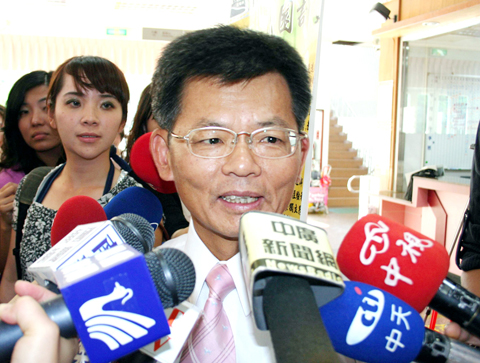The Democratic Progressive Party (DPP) is looking for ways to resolve a serious split in its ranks following yesterday’s declaration by Kaohsiung County Commissioner Yang Chiu-hsing (楊秋興) that he intends to run as an independent in the Nov. 27 special municipality elections for Greater Kaohsiung mayor.
“I’ve made up my mind [to run]. I will announce my bid at an opportune moment,” Yang said.
It was the first time Yang publicly confirmed his intention to run since he lost the DPP primary on May 5 to Kaohsiung Mayor Chen Chu (陳菊).

PHOTO: CNA
The residents of Greater Kaohsiung deserved another choice, particularly given what he characterized as the economic downturn of the past few years, Yang said.
“As a local who grew up here, I’m very concerned,” he said, adding that he felt he had to “shoulder greater responsibility.”
Ever since Yang lost the primary, there have been rumors of infighting between the two, fueling speculation that Yang might run as an independent.
Yang is widely believed to have been disappointed by the telephone poll that the DPP used in its primaries. He was listed, along with Chen, as two of the three top-ranked municipal officials in a recent poll by the Chinese-language United Daily News.
The spat became more public last week when the Kaohsiung County Government issued a press release accusing Chen of making personal attacks on Yang’s wife.
Chen allegedly told a meeting of municipal school principals on Monday that she was surprised to discover that there were factions among principals in the county.
“I am unmarried. I don’t have a spouse to help me build factions,” Chen reportedly said.
Yang accused Chen of attacking his wife and said that his family has never been involved in county government affairs.
Chen said she and the party would try to resolve the split.
When asked if she would be willing to work with Yang, Chen said she was open to “all kinds of possibilities.”
Chen’s campaign spokesman, Chao Tien-lin (趙天麟), said the mayor, the DPP and members of pro-localization groups had repeatedly tried to talk to Yang to resolve the divisions left by the primary.
“But we have run into a brick wall in terms of communication,” Chao said.
Meanwhile, Chinese Nationalist Party (KMT) Legislator Huang Chao-shun (黃昭順), who is running against Chen in the mayoral race, said she was paying little attention to splits in the DPP, preferring instead to make sure she is fully prepared for the election campaign.
Also See: DPP concerned over Yang's poll plan

MORE VISITORS: The Tourism Administration said that it is seeing positive prospects in its efforts to expand the tourism market in North America and Europe Taiwan has been ranked as the cheapest place in the world to travel to this year, based on a list recommended by NerdWallet. The San Francisco-based personal finance company said that Taiwan topped the list of 16 nations it chose for budget travelers because US tourists do not need visas and travelers can easily have a good meal for less than US$10. A bus ride in Taipei costs just under US$0.50, while subway rides start at US$0.60, the firm said, adding that public transportation in Taiwan is easy to navigate. The firm also called Taiwan a “food lover’s paradise,” citing inexpensive breakfast stalls

TRADE: A mandatory declaration of origin for manufactured goods bound for the US is to take effect on May 7 to block China from exploiting Taiwan’s trade channels All products manufactured in Taiwan and exported to the US must include a signed declaration of origin starting on May 7, the Bureau of Foreign Trade announced yesterday. US President Donald Trump on April 2 imposed a 32 percent tariff on imports from Taiwan, but one week later announced a 90-day pause on its implementation. However, a universal 10 percent tariff was immediately applied to most imports from around the world. On April 12, the Trump administration further exempted computers, smartphones and semiconductors from the new tariffs. In response, President William Lai’s (賴清德) administration has introduced a series of countermeasures to support affected

CROSS-STRAIT: The vast majority of Taiwanese support maintaining the ‘status quo,’ while concern is rising about Beijing’s influence operations More than eight out of 10 Taiwanese reject Beijing’s “one country, two systems” framework for cross-strait relations, according to a survey released by the Mainland Affairs Council (MAC) on Thursday. The MAC’s latest quarterly survey found that 84.4 percent of respondents opposed Beijing’s “one country, two systems” formula for handling cross-strait relations — a figure consistent with past polling. Over the past three years, opposition to the framework has remained high, ranging from a low of 83.6 percent in April 2023 to a peak of 89.6 percent in April last year. In the most recent poll, 82.5 percent also rejected China’s

PLUGGING HOLES: The amendments would bring the legislation in line with systems found in other countries such as Japan and the US, Legislator Chen Kuan-ting said Democratic Progressive Party (DPP) Legislator Chen Kuan-ting (陳冠廷) has proposed amending national security legislation amid a spate of espionage cases. Potential gaps in security vetting procedures for personnel with access to sensitive information prompted him to propose the amendments, which would introduce changes to Article 14 of the Classified National Security Information Protection Act (國家機密保護法), Chen said yesterday. The proposal, which aims to enhance interagency vetting procedures and reduce the risk of classified information leaks, would establish a comprehensive security clearance system in Taiwan, he said. The amendment would require character and loyalty checks for civil servants and intelligence personnel prior to